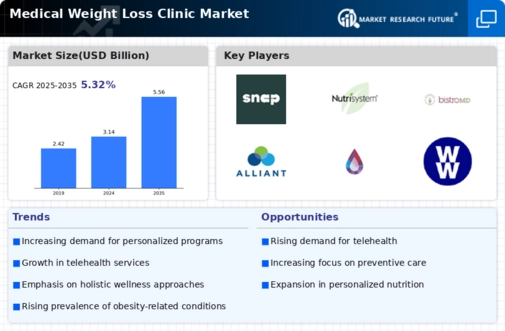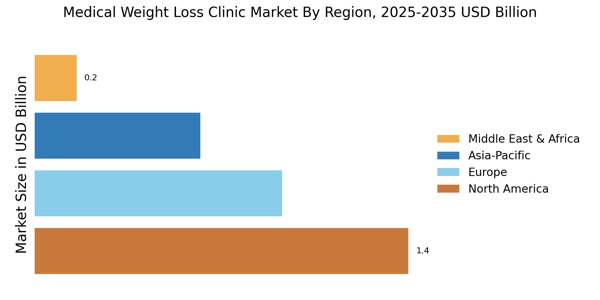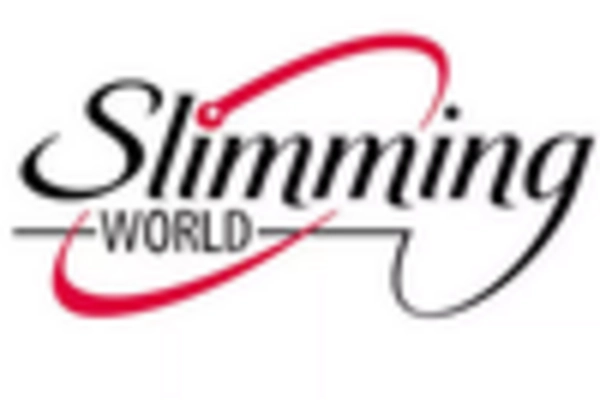Aging Population
The aging demographic is a crucial factor influencing the Medical Weight Loss Clinic Market. As the population ages, the prevalence of obesity and related health issues tends to increase, necessitating specialized weight management services. Older adults often face unique challenges in maintaining a healthy weight due to metabolic changes and sedentary lifestyles. Consequently, medical weight loss clinics are adapting their offerings to cater to this demographic, providing programs that address the specific needs of older patients. This includes incorporating low-impact exercise regimens and nutritional guidance tailored to age-related health concerns. The growing recognition of the importance of weight management in promoting longevity and quality of life is likely to drive demand for these services. As the aging population continues to expand, the Medical Weight Loss Clinic Market is expected to thrive, offering targeted solutions for weight management.
Rising Obesity Rates
The increasing prevalence of obesity is a primary driver for the Medical Weight Loss Clinic Market. According to recent statistics, approximately 42% of adults in certain regions are classified as obese, which has prompted a surge in demand for effective weight management solutions. This alarming trend is likely to continue, as lifestyle changes and dietary habits contribute to weight gain. Consequently, medical weight loss clinics are becoming essential for individuals seeking professional guidance and support. The industry is responding by offering tailored programs that address the unique needs of patients, thereby enhancing the overall effectiveness of weight loss strategies. As awareness of obesity-related health risks grows, the Medical Weight Loss Clinic Market is poised for significant expansion, catering to a population increasingly in need of specialized weight management services.
Increased Health Awareness
There is a notable rise in health consciousness among individuals, which serves as a significant driver for the Medical Weight Loss Clinic Market. As people become more informed about the health implications of obesity, including diabetes, heart disease, and other chronic conditions, they are actively seeking professional assistance to manage their weight. This trend is reflected in the growing number of individuals enrolling in medical weight loss programs, which are designed to provide comprehensive support and education. The industry is adapting to this shift by incorporating evidence-based practices and personalized approaches to weight management. Furthermore, the integration of nutritional counseling and behavioral therapy into clinic offerings enhances the appeal of these services. As health awareness continues to escalate, the Medical Weight Loss Clinic Market is likely to experience sustained growth, driven by an informed consumer base prioritizing their well-being.
Technological Advancements
Technological innovations are transforming the Medical Weight Loss Clinic Market, providing new tools and methodologies for weight management. The integration of telemedicine, mobile applications, and wearable devices has revolutionized how clinics interact with patients. These technologies facilitate remote consultations, allowing individuals to receive guidance and support from the comfort of their homes. Moreover, data analytics enables clinics to tailor programs based on individual progress and preferences, enhancing the effectiveness of weight loss strategies. The market is witnessing an influx of digital platforms that offer personalized meal plans and exercise regimens, further driving consumer engagement. As technology continues to evolve, the Medical Weight Loss Clinic Market is likely to expand, attracting tech-savvy individuals seeking innovative solutions for their weight management challenges.
Regulatory Support and Guidelines
Regulatory frameworks and guidelines are increasingly supporting the Medical Weight Loss Clinic Market, contributing to its growth. Governments and health organizations are recognizing the importance of addressing obesity as a public health issue, leading to the establishment of policies that promote weight management initiatives. This includes funding for research, public awareness campaigns, and the development of best practice guidelines for weight loss clinics. Such support not only legitimizes the industry but also encourages the establishment of new clinics and programs. Furthermore, adherence to regulatory standards enhances the credibility of medical weight loss services, attracting more clients seeking reliable solutions. As regulatory support continues to strengthen, the Medical Weight Loss Clinic Market is likely to benefit from increased investment and innovation, fostering a more robust environment for weight management services.

















